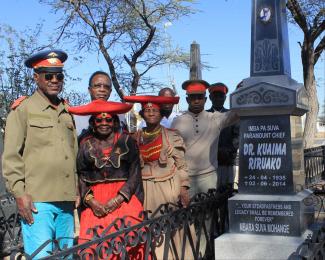Germany and Namibia
Hurdles on reconciliation between Germany and the Ovaherero

In 2015, a spokesperson of the Federal Foreign Office acknowledged that the war waged by German troops in the colony of German South West Africa in 1904 amounted to genocide. The victims were from the Ovaherero and Nama ethnic groups (and, to some extent, the Damara and San as well).
Since then, Germany and Namibia have been engaged in bilateral talks to make amends for the crimes committed by the colonial power more than a century earlier.
The negotiations are being observed with interest around the world. After all, no other former colonial power has made similar concessions so far, even though colonial rulers wiped out ethnic groups elsewhere too. In the three former British colonies New Zealand, Canada and Australia, however, governments have made various gestures to survivors of indigenous peoples.
Germany’s attempt to address the injustice could set a precedent. The negotiations with Namibia are thus something of a balancing act. The Federal Government is keen to avoid the far-reaching consequences that a full admission of guilt would entail.
After five and a half years of negotiations, the special envoys of both countries agreed a joint declaration in Berlin in mid-May 2021. Its programmatic title reads: “United in remembrance of our colonial past, united in our will to reconcile, united in our vision of the future.”
The document was supposed to be ratified by both foreign ministers in Windhoek in June, but then came the pandemic. There is, moreover, massive opposition in Namibia. Judging by recent developments, the Namibian side is unlikely to approve the declaration in its current form.
Admission of guilt
In the declaration, Germany’s admission of guilt is unequivocal: “The German Government acknowledges that the abominable atrocities committed during periods of the colonial war culminated in events that, from today’s perspective, would be called genocide.” As so often, however, the devil is in the detail. In this case, the words “today’s perspective” are the problem. They mean that though Germany “accepts a moral, historical and political obligation to tender an apology for this genocide and subsequently provide the necessary means for reconciliation and reconstruction,” it does not acknowledge any legal duties. Accordingly, the term “reparations” is not mentioned either.
Heiko Maas, then Germany’s foreign minister, spoke in the Bundestag, the federal parliament on 9 June 2021. He insisted that the agreement was voluntary and denied there was any legal obligation to make payments. “This is not comparable to the issue of reparations,” he added.
As a matter of fact, the unsigned declaration notes that it settles “all financial aspects of the issues relating to the past”. In May 2021, Maas had told the press that € 1.1 billion were to be made available to support reconstruction in Namibia. He said that was a “gesture of recognition of the immeasurable suffering,” but clarified that legal claims for compensation could not be derived from the declaration.
The € 1.1 billion of German “reconstruction assistance” would be provided over a period of 30 years and support development projects in seven of the country’s regions. The majority of the descendants of those who were killed in the war of annihilation live in these regions today. It makes sense to spend the money on rural development and infrastructure. In particular, it would be good to focus on issues of unfair land distribution and of land ownership which goes back to colonial times (see my contribution on www.dandc.eu).
A drop in the ocean
What is deeply problematic is that the amount pledged is a mere drop in the ocean. It is roughly what Germany has spent on development efforts in Namibia since the country became independent. The joint declaration stresses the intention “to heal the wounds of the past and create a lasting future partnership.”
Not every comparison is fair, but it makes sense to put the € 1.1 billion in perspective. In 2021, Jens Spahn, then Germany’s health minister, spent 1 billion euros on coronavirus masks of dubious quality. After the Boxing Day tsunami in the Indian Ocean in 2004, German private donors and government agencies drummed up € 1.1 billion in just six months’ time. Stuttgart’s new train station (S21) will cost an estimated € 9 billion, and Berlin’s new airport came in at € 7 billion.
Some German critics have pointed out that the € 1.1 billion support for Namibia is quite paltry. Ruprecht Polenz, the German government’s special envoy for addressing the colonial history in Namibia, asked them how much they would consider appropriate. This is another example of the colonial view still prevailing. After all, it is not Germans who should decide. If Germany wishes seriously to redress the situation, the question should be put to the people of Namibia.
So far, any top-ups to the planned funding have been categorically ruled out. That will presumably also apply to the € 50 million earmarked for “appropriate ways of memory and remembrance”, including “projects on reconciliation, remembrance, research and education”. By contrast, Berlin’s Holocaust memorial in Berlin cost € 28 million to build on land that is worth another € 40 million. Running the Humboldt Forum in Berlin is expected to cost € 60 million per year. It is the reconstruction of the historic City Palace, cost € 700 million and now serves as a museum.
Popular opposition
According to the draft declaration, Germany “apologises and bows before the descendants of the victims”, whereas the “Namibian Government and people accept Germany’s apology”. The aim is to “close the painful chapter (...) and mark a new dawn in the relationship”. Yet the people of Namibia were not even asked whether they would accept the apology.
While bilateral negotiations may foster – and even be necessary for – international understanding between different nations, they are no guarantee of understanding. Key representatives of the descendants of those who were directly affected by the genocide did not take part in the talks. Members of the diaspora which resulted from the forced expulsions in the early 20th century were not given consideration either.
Unsurprisingly, the declaration has sparked heated debates in the Namibian parliament. Opposition parties showed unprecedented unanimity in rejecting it. Even leading representatives of SWAPO (South-West Africa People’s Organisation), the governing party, saw scope for improvement – at least in financial terms. They included the deputy president and the prime minister.
Follow-up negotiations
The vehement opposition prompted the Namibian government to announce follow-up negotiations in late November 2021. Though Germany has categorically rejected any such talks, the coalition treaty of the new Federal Government does note: “Reconciliation with Namibia remains an indispensable duty that arises out of our historic and moral responsibility.”
In early 2022, Berlin signalled that the ball was now in Namibia’s court. Speaking about follow-up negotiations, a government spokesperson said of the declaration: “An offer from the German side is on the table, and the Namibian side must now decide how to respond to this offer.” It is not clear whether this would allow further talks.
So far, the “reconciliation agreement” has not lived up to its name. Ovaherero and Nama representatives feel snubbed by their exclusion from the negotiations. They are demanding direct talks with the German government. Their stance does not make the situation any easier. Diplomatic conventions will hardly permit talks that do not involve the Namibian government. That, however, should not impede civil-society efforts to promote understanding and international relations in any way.
Related reading
A collection of individual accounts given primarily by German politicians and cultural professionals, as well as by some of those directly affected (including of German descent) in Namibia, was published in March 2022. The German-language book (Melber and Platt, 2022) is an attempt to understand the different ways in which history is viewed in the present day and to show that the impacts of colonial crimes are not limited to the past. The introduction emphasises: “In future, it will not be a question of adding one more day of commemoration, but of re-examining our own narratives.” It is necessary to face up to, acknowledge and reduce the asymmetries that still result from the colonial view.
Reference
Melber, H., Platt, K., (ed.): 2022: Koloniale Vergangenheit – postkoloniale Zukunft? Die deutsch-namibischen Beziehungen neu denken (“Colonial past – postcolonial future? Rethinking German-Namibian relations” – in German only). Frankfurt/Main, Brandes & Apsel.
Henning Melber came to Namibia as a German youngster. He supported the independence struggle and joined SWAPO in 1974. He later ran the Namibian Economic Policy Research Unit in Windhoek, before serving as research director at the Nordic Africa Institute and later director of the Dag Hammarskjöld Foundation (both in Uppsala). He is also an extraordinary professor at the University of Pretoria as well as the University of the Free State in Bloemfontein.
henning.melber@nai.uu.se







